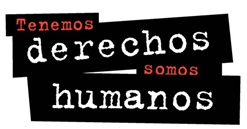
“Las ventanas del frente de la casa permanecen abiertas. Desde fuera se logran ver el cuadro de la crucifixión y un tapiz de navidad que se cuelga cada año por estas fechas. Se escucha el diálogo de dos jóvenes que al pasar por la acera, e introducir sus miradas hacia el interior, dicen:
- Viste que bonitos esos cuadros, parece que esa “gente” es religiosa.
A lo que el otro joven responde:
- No, esa es la casa de los derechos humanos”.
Un sencilla anécdota que puede ser repetida, y de hecho se repite muchas veces en Cuba, desde hace algún tiempo.
El objetivo: satanizar a todo el que piense diferente, espantar de su alrededor a toda persona que desee acercarse para conocer e interactuar; ver fantasmas donde no los hay y hacer juicios erróneos sobre las personas y los hechos.
Las causas: la profunda falta de educación ciudadana que imposibilita darse cuenta de que los derechos humanos son universales, de todos y para todos; la carencia de instituciones reconocidas para la defensa de los derechos humanos; la doble moral que hace sucumbir ante lo mal hecho, alzar la mano y decir estar de acuerdo cuando no se está y manifestarse en contra de los propios principios porque “es lo que toca en estos tiempos”.
- Hits: 6296
 In December 2017, Daniel Ceballos, the former mayor of San Cristóbal, secretly slipped a letter out that detailed his prison conditions for the past two months. Since October 2017, he has been held in solitary confinement, forced to wear an ankle bracelet, is photographed daily by prison guards, and denied visitation rights to see his family and lawyers.
In December 2017, Daniel Ceballos, the former mayor of San Cristóbal, secretly slipped a letter out that detailed his prison conditions for the past two months. Since October 2017, he has been held in solitary confinement, forced to wear an ankle bracelet, is photographed daily by prison guards, and denied visitation rights to see his family and lawyers.